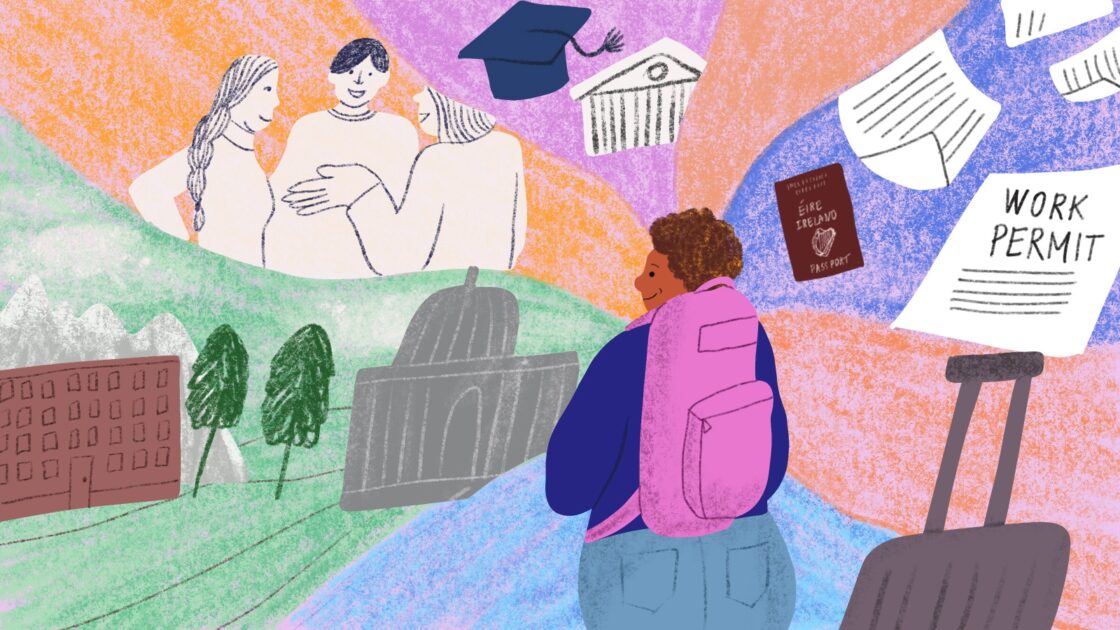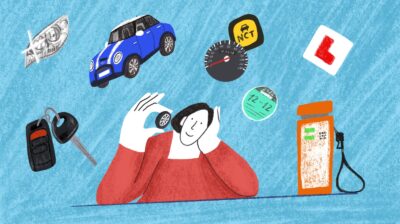How to move to a new country
Moving abroad can be exciting, but there are many things to consider before deciding to move

Whether you’re looking for a new adventure, or you are hoping to find better work or accommodation opportunities abroad, moving to a new country can be both an exciting and stressful experience.
It’s important to do your research before moving abroad. Making sure you have everything in place in advance will make the transition to a new country easier, and less stressful.
In this article:
- Deciding where to move to
- Arranging documents and visas
- Applying for work permits
- Finding work abroad
- Studying abroad
- Finding somewhere to live
- Arranging healthcare
- Traveling around a new country
How to move to a new country
Here are some things to consider before you make your move:
Deciding where to move to
You might have a country in mind, or you may be open to exploring a few options, but spending time thinking about where you’re going to move to is important. There are a few things to consider before making your decision about where to go:
- What language do they speak?
- Can I find work through my native language if I don’t speak the local language?
- Will I be able to meet people and make connections?
- What is the cost of living?
- Have I considered the cost of bills and rent?
- Can I afford to move there?
- Do I have enough money saved?
- What type of work is available?
- How safe is the city or country?
- What is the tax system in the country, and how will I manage my taxes?
Moving abroad can lead to a culture shock, when the customs and culture of a new place are very different to your own. No matter how much research you do, you may still experience culture shock – but spending time thinking about the questions above can help to make the transition easier after you arrive.
Arranging documents and visas
Before you even begin to plan your move, you will need to make sure you have all of your documents in order, and that you have permission to live and work in the country you’re moving to. This can include:
- Making sure your passport is in date
- Applying for a work or study permit
- Making sure you have travel insurance (some countries will require this in order to issue a work permit)
- Making sure you are up to date on any required vaccinations (this will only apply to certain countries)
- If you live in the European Union (EU), you can apply for a European Health Insurance Card which allows you to access public healthcare in another EU/European Economic Area (EEA) state for free or at a reduced rate.
If you’re a citizen of the European Union (EU), you can live and work in another EU country and Norway, Iceland, Lichtenstein and Switzerland without needing to apply for a work permit. Some EU countries require you to report your presence to the relevant authorities (often the town hall or local police station) within a reasonable period of time after arrival, so make sure to find out if you need to do this.
Applying for work permits
A work permit is an official document that shows you are allowed to work in a certain country for a period of time. This is different to a travel visa that allows you to visit a country, but not work or study there. Some countries will require you to get a work permit if you want to take up employment there.
If you’re moving to a country where you require a work permit, make sure to give plenty of time to fill out the application and wait for a decision before you begin making other plans. Some countries have a lottery system that will invite interested people to apply for a work permit every few months, so you may need to wait until you receive an invitation before you can apply.
As part of the application, you may be asked to provide information about the other places you’ve lived, your work history, and provide a police certificate confirming whether or not you have a criminal record. Start gathering these documents as early as possible to avoid delays.
After you submit your application, it could take a number of weeks or even months before you receive a decision. It’s best to wait until after your application has been approved before making other plans or arrangements.
Finding work abroad
Once you’ve been approved to work in a new country, you can begin looking for job opportunities. There are a few ways you can find work:
- Use job websites like Indeed, or find out about similar sites in that country
- Post about your move on LinkedIn and let people know you’re looking for work
- Use a recruitment service
- Ask around and find someone who has lived there for information or advice
- If you work in a certain industry, talk to contacts in your network or reach out to people working in that area in the country you’re moving to on LinkedIn and ask about opportunities
For job opportunities in Europe, Eurodesk and the European Youth Portal can offer advice and point you towards opportunities for studying, working or volunteering abroad.
Studying abroad
There are several options available if you want to study abroad. It’s important to look for information on things like fees for international students, whether or not you’ll need a work permit, and the language you can study through. Different countries will have different requirements for applying to and being accepted to college, so take the time to do your research.
If you’re interested in studying in Europe, EUNiCAS can offer information, advice and support. You can also look into International Education Financial Aid (IEFA) to find out about scholarships and other financial aid available for studying in another country.
Find out more about applying for college abroad.
Finding somewhere to live
Figuring out where you’re going to live after moving to a new country can be daunting, but there are a few things you can do to make the process of finding accommodation smoother.
- Research different neighbourhoods and the public transport available in different areas
- Find out about the current state of the housing market in the area
- Find out the average cost of rent and other expenses, like groceries and bills, so you can work out a budget
- Find out about the most popular websites for advertising accommodation in the country you’re moving to
- Find out if there is a certain date of the month when people move in and out of accommodation
- Make sure you have enough money to pay a deposit and the first month’s rent when you move in – in some places you may need as much as three months’ rent upfront, so make sure to do your research beforehand
- Prepare references from previous landlords (or employers/organisations you’re a part of if you have never rented before)
It can take time to find accommodation, so make sure you have arrangements in place while you’re looking. This could mean staying in a hostel, and airbnb, or with a friend until you’ve found somewhere to live.
Arranging healthcare
Finding out about the healthcare system in the country you’re moving to is important in case you have ongoing conditions, emergencies crop up, or you become unwell at any time. If you have a work or study permit, you may have been required to take out travel insurance that could cover certain illnesses or injuries, but be sure to check the details of your policy so you know for certain.
Things like doctor visits and prescriptions are not likely to be covered by travel insurance. Once you are settled in your new town or city, register as a patient with a local doctor and find out where the nearest pharmacy is. If the country or city you moved to has a public health system or another type of healthcare scheme, find out if you are eligible to sign up.
Depending on where you are travelling to, you may need to get certain vaccinations before travelling. Make sure to inform yourself of what is needed before travelling to a new country and give yourself time to arrange it.
If are a citizen or resident of the EU, you can apply for a European Health Insurance Card (EHIC) which allows you to access public healthcare in another EU/EEA state for free or at a reduced rate. However, the EHIC is only valid for short-term stays.
Figure out how you’re going to get around
Public transport is different in every city, so it’s good to familiarise yourself with the system in the place you’re moving to. Do they have a metro system, light rail, or buses? Is it a cycling-friendly city? How well connected are the routes? How much does it cost to take public transport?
If you plan to drive in the country you’re moving to, you may need to apply for a new driving licence. Some countries have driving licence exchange agreements with Ireland, which means you can exchange your existing Irish driving licence for one issued by the country you have moved to. You can then exchange it back if you return to Ireland.
In other countries, you may need to take another driving test in order to get a licence for that country. You might also be able to continue using your Irish driving licence for a certain period of time (sometimes this can be up to a year), but once that time period has passed, you will need a local licence to continue driving.
If you’re moving to an EU country, you can continue to use your Irish driving licence provided it is still valid.
It’s also important to make sure you have insurance and motor tax in place.
Look forward to the experience
Planning a move abroad can be overwhelming, and it can be easy to get caught up in that stress. It’s important to also get excited about the new experiences
Illustrations by Marina Marinina.
Need more information, advice or guidance?
We offer information, advice and guidance about the issues that matter to you. Our online Youth Information Chat service is for 16 to 25 year olds and is available Monday to Friday, 4pm to 8pm (excluding Bank Holidays).






